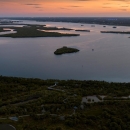Laws and Regulations
The Kulm Wetland Management District was established under certain laws and complies with or upholds regulations and laws that are applicable to our work. Some of these laws are at the core of our daily activities while others are encountered less frequently. Some of the regulations are more relevant to our duties, while others give guidance to visitors.
For a more direct listing of what you can or cannot do on Waterfowl Production Areas within our District, please visit the Rules and Policies listing in the Visit Us section or call our office with questions.

